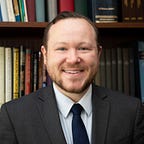The Force is Strong With This One
Seemingly unattainable just 7 years ago, the world has accomplished a remarkable feat — in under a year, 195 nations have come together to not only agree to a global agreement on combatting climate change but a sufficient number have also ratified the agreement, shepherding it into legal force.
We frequently see the terms “transformational” or “paradigm shift” used in the climate change space, often without an explanation of what these terms mean. Perhaps the best example of what these terms aspire to, and should mean as climate action advances, is the quantum leap that took place between December 2009 in Copenhagen and Paris in 2015.
In six short years, the international community went from an air of disappointment and an acceptance of dysfunction following COP15 to one of guarded cheerfulness and cautious optimism in the wake of COP21.
It’s interesting to reflect on what has changed in this period. Certainly there have been leadership changes in some influential countries which have contributed to a more constructive negotiating environment and a recognition, at the uppermost levels of government, that humanity is driving climate change. More importantly, perhaps, the effects of climate change are becoming more apparent in the world — from rising sea levels to record high temperatures to increased precipitation — scientific evidence is now being supported by observable changes in the real world.
At the same time, the Paris Agreement — and the diplomatic process that delivered it — recognizes a fundamental truth. Humanity is one. We are a single, interdependent whole living in a shared, fragile biosphere. Likewise, the Paris Agreement highlights the fact that an emerging collective consciousness and an acknowledgement of our shared world citizenship is beginning to shape humanity’s global endeavors.
Of course, the Paris Agreement is not a climate panacea. It is the glimmerings of a new dawn in our collective response to climate change. And it is not without its demerits. As recently pointed out by Robert Watson, a British-American scientist and former head of the U.N.’s panel of climate experts, in a Reuters story:
“The key question will be implementing the agreement. There’s no legal enforcement of pledges. The hope is governments will feel a “moral obligation” and “peer pressure” to act.”
The successful implementation of the Paris Agreement will require the effective involvement of the diversity of the World’s stakeholders — governments, civil society, private sector, NGO’s, indigenous groups, faith-based organizations and more. While there is certainly overlap between many of the stakeholders listed above, faith groups have been vocal about naming climate change a moral issue and, as such, it is perhaps faith groups who should take on the task of unpacking what is involved in helping governments to feel the moral obligation of climate action.
A necessary first step in this process will be elucidating what is meant by “morality” and “moral obligation.” Collectively, we have to strive to understand the implications of the principles and qualities that support moral action in the climate sphere. As we begin to understand what principles such as justice, unity, equality, moderation and sacrifice mean in the context of climate change we may also begin to see that such principles can serve as both a driver of action and a source of continued motivation. It must be noted, of course, that noble principles and faith-based motivation — whether that be religious faith, faith in diplomacy or faith in the UNFCCC process — do not automatically equate to sustainable action for our common good.
With this in mind, we clearly need to learn about how principles and qualities can become expressed in committed, sustained action. As the stakeholder groups mentioned above begin to collaborate more deeply to address the moral imperative of climate change in light of the Paris Agreement, it is possible that our collective capacity will be strengthened to the point where we all, regardless of background, begin to see ourselves as instrumental protagonists in the crusade to safeguard our shared ecosystem and ensure our future collective security.
�
